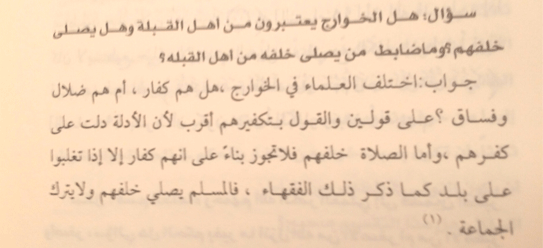In the Name of Allāh, the Ever Merciful, the Bestower of Mercy
Prophet Muḥammad (ﷺ) said, “there will appear at the end of time a people who are young of age, foolish-minded. They will speak with the best (and most-alluring) of speech (that is spoken) by people and will recite the Qurʾān but it will not go beyond their throats. They will pass out of Islām as the arrow passes through its game. Whoever meets them, let him kill them, for there is a reward for whoever kills them.”

A Response to Joas Wagemakers’s False Claim Regarding Shaykh Muḥammad Nāṣir Al-Dīn Al-Albānī in His Book ‘Salafism in Jordan’ (2016)
Excerpt: Joas Wagemakers falsely ascribes to al-Albānī the conviction that deeds ‘could not decrease faith or take it away altogether’. Joas Wagemakers is an Assistant Professor at Utrecht University and has written extensively on Salafism.
He frames the Khārijites as Salafists by taking their claims at face value whilst lacking the knowledge and insight to penetrate the deception and sophistry of modern-day Khārijite ideologues and movements. Wagemakers’s 2012 book, “A Quietist Jihādi”, centred around the Takfīrī Khārijite Abū Muḥammad al-Maqdisī is first-hand evidence of this and demonstrates how he has been taken for a ride by al-Maqdisī.
Source: https://www.kharijites.com/kj/articles/cligbpcyn-joas-wagemakers-claim-regarding-al-albani-in-his-book-salafism-in-jordan-2016.cfm
You can download the PDF above by clicking here.
Salafī Imām Abū Bakr al-Ājurrī (360H) on the Khārijite Renegades
Excerpt: The Salafī scholar, Abu Bakr Muḥammad bin al-Ḥusayn al-Ājurrī (360H) said: The scholars have not differed that the Khārijite (extremists) are an evil people, disobedient to God and His Messenger, even if they pray, fast and strive hard in worship.
Source: https://www.kharijites.com/kj/articles/pjmuzcuqh-abu-bakr-al-ajurri-360h-on-the-kharijite-renegades.cfm
You can download the PDF above by clicking here.
Salafī Imām Ḥarb Bin Ismāʿīl Al-Kirmānī (280H) on the Khārijites
Excerpt: The Salafī Imām, Ḥarb bin Ismāʿīl al-Kirmānī (280H), from the associates and students of Imām Aḥmad, stated:
As for the Khārijites, they passed through the religion and separated from it. They broke loose from Islām and isolated themselves from the jamāʿah. They strayed away from the path of guidance, revolted against the ruler and the leaders, raised the sword against the ummah and made lawful [the spilling] of their blood.
Source: https://www.kharijites.com/kj/articles/pnsqzcikr-salafi-imam-harb-bin-ismail-al-kirmani-280h-on-the-kharijites-.cfm
You can download the PDF above by clicking here.
Abū al-Ḥusayn al-Malṭiyy al-Shāfiʿīyy (377H) on Khārijite Movements
Excerpt: As for the first sect of the Khārijites, they are the Muḥakkimah, those who would depart with their swords to the markets, gather the people together whilst they were heedless [of who they were] and starting calling out, ‘Judgement belongs to none but Allāh’.
Source: https://www.kharijites.com/kj/articles/byztkuzag-abu-al-husayn-al-maltiyy-al-shafiiyy-377h-on-kharijite-movements.cfm
You can download the PDF above by clicking here.
Salafī Imām ʿAbdullāh Ibn al-Mubārak (179H) on the Defining Traits of the Khārijites
Excerpt: The Salafī Imām, ʿAbdullāh bin al-Mubārak (179H) said: “Whoever spoke of [the obligation of] praying behind every righteous or sinful [leader], made jihād behind every leader, did not view [the permissibility] of revolting against the leader with the sword and supplicated for their rectification has departed from the statement of the Khārijites, from its beginning to its end.”
Source: https://www.kharijites.com/kj/articles/xwotlgmfm-abdullah-ibn-al-mubarak-179h-on-the-defining-traits-of-the-kharijites.cfm
You can download the PDF above by clicking here.
ibn-al-mubarak-kharijite-traitsYou can download the PDF above by clicking here.
Imām al-Ājurrī (360H) on the Khārijites and Takfīr of Rulers Through Faulty Interpretation of Verses
Excerpt: The Salafī scholar, Abu Bakr Muḥammad bin al-Ḥusayn al-Ājurrī (360H) explains how the Khārijites misinterpret verses of the Qurʾān to justify takfīr of the rulers.
Source: https://www.kharijites.com/kj/articles/grbohvkco-imam-al-ajurri-360h-on-the-kharijites-and-takfir-of-rulers.cfm
You can download the PDF above by clicking here.
Ibn Taymiyyah (728H) on the Affair of the Khārijites Being Hidden to Most People
Excerpt: Shaykh al-Islām Ibn Taymiyyah (728H) said:Some factions are greater in their opposition to the Messenger than others, and others are more apparent in their opposition [than others]. However, the apparentness [of such opposition] is a relative matter.
Source: https://www.kharijites.com/kj/articles/tazrnudlx-ibn-taymiyyah-affair-of-the-kharijites-hidden-to-most-people.cfm
You can download the PDF above by clicking here.
Khārijite Abū Muḥammad Al-Maqdisī: Raising and Flying Flags of Muslim Nation States Is Apostacy
Abū Muḥammad al-Maqdisī ʿIṣām al-Barqāwī is a chief ideological instigator of extremism and terrorism and one of the main inspirations behind al-Qaeda and ISIS takfīrī, jihādī ideology. His anterior hides behind the label of ‘Salafī-Jihādist’. Meanwhile, his posterior excretes Khārijite ideology, which includes takfīr on account of what does not amount to sin let alone what amounts to sin.
His easily identified core Khārijite concepts are derived through the writings of Quṭb and al-Mawdūdī (seeherefor details) and are similar to those of the Khārijites of old in focusing around issues of taḥkīm, ḥākimiyyah and khurūj as quintessential elements of faith. In his works and writings, he makes takfīr of all contemporary Muslim rulers and governments, their army and police divisions and any subsidiary institutions, as well as scholars and employees who actively support them.
He considers their removal from the greatest of religious obligations, without which the foundation of Islām, Īmān and Tawḥīd cannot be established. This core doctrine forces him to concur with the sects of the Khārijites of old in their subsidiary doctrines and oppressive judgements, save that he denies it with his tongue and pen. Agreeing with the Khārijites in substance, he plays word-games with labels and titles to camouflage his corrupt merchandise.
Excerpt: The Khārijite renegade and ideological terrorist, Abū Mūhammad ʿĀṣim al-Barqāwī al-Maqdisī – demonstrating the extent to which he wallows in the doctrine of the Khārijites claims that raising the flags of Muslim nation states is from the mukaffirāt (what expels from Islām).
Source: https://www.kharijites.com/kj/articles/bpqbcexcb-kharijite-abu-muhammad-al-maqdisi-raising-and-flying-flags-apostacy.cfm
You can download the PDF above by clicking here.
Shaykh Ṣāliḥ Al-Fawzān: The Khārijites Are Closer to Being Disbelievers and Prayer Is Not Said Behind Them
Question:
In his lessons on Nawāqiḍ al-Islām, the Shaykh was asked: Are the Khārijites considered from the people of the qiblah (i.e. Muslims) and are they to be prayed behind? What is the principle for praying behind a person from the people of the qiblah?
Answer:
Shaykh Ṣāliḥ al-Fawzān: The scholars have differed about the Khārijites, are they disbelievers or are they misguided and sinful – upon two sayings. The saying that they are disbelievers [outside the fold of Islām] is closer to [the truth] because the evidences indicate their disbelief. As for prayer behind them, it is not permissible built upon them being disbelievers except when they have taken over a land as has been mentioned by the jurists. In that case, the Muslim prays behind them and does not abandon the congregational prayer.
Reference: Durūs Fī Sharḥ Nawāqiḍ al-Islām (1425H) p. 170.

Note that takfīr of the Khārijites has also been indicated by Imām al-Bukhārī, al-Qāḍī Abu Bakr, al-Subkī, al-Qurṭubī, al-Qāḍī ʿIyāḍ, al-Nawawī and likewise Imām Ibn Bāz. Shaykh al-Fawzān has mentioned above that scholars have differed in this regard and in the answer above, the Shaykh states that the view closer to the truth is that the Khārijtes are disbelievers. The Shaykh also has other verdicts in which he tends to the view that they are misguided sinners and not disbelievers.
The Dispute Between Abū Muḥammad al-Maqdisī and ISIS: Khārijites Falling Out with Each Other with Respect to Matters of Khārijite Jurisprudence
Differences Between Modern-Day Khārijites
Throughout his dark history, the Khārijite Qaʿdī terrorist, Abū Muḥammad al-Maqdisī, has repeatedly fallen out with other Khārijites. Whilst in Kuwait, he studied with Muḥammad Surūr for a while before differing and splitting with him. The Surūrites expelled him from their circles. Likewise he joined the circles of the Juhaymānites for a while before having disputes with them and splitting with them. It was during his time with the Juhaymānites that he authored most of his works outlining the Khārijite doctrine on the back of the core ideas of Quṭb and Mawdūdī that focus on legislation and rulership.
The Juhaymānites also made him outcast due to his hastiness in takfīr, and he retaliated by writing a tract against them, accusing them of being ‘minor tāghūts’. [Tabdīd Kawāshif al-ʿAnīd (1428H) pp. 22-26]. He fell out with another Khārijite, Abū Muṣʿab al-Zarqāwī (a student of al-Maqdisī) who wrote rebuttals of al-Maqdisī and his self-centredness. After the emergence of the Khārijites of ISIS and their deeds (no doubt influenced through his ideological writings), he started distancing himself from them and claiming that “amongst them are Khārijites” without actually applying the label to them as a whole. Over the past couple of years, al-Maqdisī has numerous letters of protest against the leadership of ISIS such as al-Baghdādī and al-ʿAdnānī. However, one should never be deceived by this vile Qaʿdī terrorist and take lessons from history.
Differences Between Khārijites of Old
The leaders of two factions of the Khārijites (the Najadāt and the Azāriqah) fell out with each other because one, Najdah bin ʿĀmir, rejected the extremism of the other, Nāfiʿ bin al-Azraq. Abū Muḥamamd al-Yamānī (6th century hijrah) relates this in his book, “Aqāʿid al-Thalāth wal-Sabʿīn Firqah” (1414H), 1/20-23. They exchanged letters with each other before departing their ways. Al-Azraq and his faction had started killing women, children, the blind, the lame, old women and the ill. They also permitted the breaking of agreements, promises and trusts. Abū Muḥamamd al-Yamānī wrote:
For Nāfiʿ bin al-Azraq was one of their shaykhs and venerated leaders, he and his sect were unique in permitting the killing of children, the blind, lame, old women and the ill. They even cast small children into pots that were boiling. They also made lawful the breaking of promises (trusts, agreements). This then reached Najadah bin ʿĀmir, one of the Khārijites, and he wrote to him …
So Najadah wrote a letter to Nāfiʿ admonishing him and telling him that Satan has misled him by killing the weak, unable and those who are non-participants in his activities and advised him to fear Allāh and cited him evidences for the prohibition of that. Then Nāfiʿ replied back justifying his activities of killing those who do not participate with him in his activities of women, children, the old and sick, and of violating promises, trusts and agreements and of appropriate the wealth of those who are not with him and his group. He advised Najdah:
Fear Allāh O Najdah and take another look at your self, there is no excuse for you except repentance and it is not permissible for you to desert us and sit away from us.
Al-Maqdisī whilst he was in Kuwait and in Saudī was upon some of these views himself – namely of violating trusts, misappropriating or stealing wealth and what is similar as has been related about him through numerous channels. So this disagreement is not between a Salafī and a Khārijite faction, rather they are all Khārijites, disputing with each other about matters of Khārijite jurisprudence, some more extreme than others, and some wallowing in takfīr more than others, and some making takfīr on account of some presumed sins and others on account of another set of presumed sins.
What they have in common in are the doctrines of Sayyid Quṭb of takfīr and ḥākimiyyah and what they demand of disfigured forms of ‘loyalty and disownment’, ‘enjoining the good and prohitibing the evil’ and ‘jihād’. Thereafter, they have clothed these doctrines with the gown of Salafism to conceal the reality of the doctrines and make it appear as if they originate with Salafi scholars. They are spuriously identified as “Salafī-Jihādists” when in reality, the accurate and honest label for them is “Takfīrī-Jihādīst Khārijites”. They simply differ with each other in the extent to which they distort the texts in order to justify their acts, whilst agreeing upon the core central Khārijite thesis they took from Quṭb and Mawdūdī, which is the primary inspiration behind these various types of acts.
One should keep in mind that the Khārijites had various sayings an opinions as it related to their judgments of takfīr and their activities and interactions with those not upon their doctrines. These differences arise because the basic doctrine that constitutes their religion and which unites them all [exaggeration in taḥkīm and ḥākimiyyah, making takfīr of all rulers, governments, their institutions such as the military, the police, and anyone who aids them and allies with them and speaking of this as the central element of Islām] is of course plain falsehood. And falsehood only produces further falsehood. So as they have nothing to prove this heretical doctrine from the revealed texts, they have to interpret the texts upon their own desires in order to justify the views that they consider and hold in relation to events and situations that arise.
Thus their differences in their interpretations of what is ‘jihād’, ‘loyalty and disloyalty’ and ‘enjoining good and prohibiting evil’ and the practical applications therein. It is inevitable that the Khārijites split, divide and fight each other, in pursuit of wealth and power, due to the very nature of their heretical doctrine. It is exactly as said of them in the Prophetic traditions and in the statements of the Companions and the Salaf, that they leave the muḥkam (decisive, specific) and perish on account of the mutashābih (ambiguous, non-specific) which they distort and misinterpret for their own ends.
As for Ahl al-Sunnah and the Scholars of the Salaf past and present, from the time of the Companions to this day of ours, the core, central Khārijite doctrine [as outlined by Quṭb and Mawdūdī] is nowhere to be found in their statements or writings. Not with Imām Aḥmad, nor Ibn Taymiyyah, nor Ibn ʿAbd al-Wahhāb, nor al-Albānī, or Ibn Bāz or others.
Abu Iyāḍ
12 Muḥarram 1438 / 13 October 2016
Shaykh ʿAbd al-Laṭīf Bin ʿAbd Al-Raḥmān Bin Ḥasan: Takfīr by Way of Sin Was a Later Development in the Khārijite Doctrine
Shaykh Sulaymān bin Saḥmān (1349H) wrote, after mentioning the story of the emergence of the Khārijites, citing from Shaykh ʿAbd al-Laṭīf bin ʿAbd al-Raḥmān bin Ḥasan (1293H), the great grandson of Shaykh Muḥammad bin ʿAbd al-Wahhāb:
This is a summary of their affair and you have come to know their misconception on account of which they firmly held the disbelief of ʿAlī and his party and Muʿāwiyah and his party. This belief remained present amongst those who had dispersed after this event. The extremists amongst them then began to make takfīr by way of major sins. Then they gained strength and [acquired a] state after which they were fought by al-Muhallab bin Abī Ṣufrah, al-Ḥajjāj bin Yūsuf. And before that, they were fought by Ibn al-Zubayr during the era of his brother, ʿAbdullāh. It was then spread about them, that they make takfīr by way of sins, meaning those which are less than shirk. End what was mentioned by our Shaykh [ʿAbd al-Laṭīf].
[Shaykh Sulaymān bin Saḥmān]: When they had such exaggeration in religion and exceeding the limit which they had been commanded (to remain within), they declared Muʿāwiyah (may Allāh be pleased with him) and whoever was with him from the Companions to be disbelievers and they declared ʿAlī bin Abī Ṭālib, the chief of the believers, (may Allāh be pleased with him) and whoever was with him from the most superior among the Companions and Successors to be disbelievers when they agreed with them [the party of Muʿāwiyah] to set up an arbitration. They claimed that allowing men to judge in Allāh’s religion is disbelief that expels from the religion. They said that they had sinned on account of this [by agreeing to it at the beginning] and had disbelieved. So they [said they had] repented from this affair and said to ʿAlī, ‘If you [also] repent, we are with you and from you, and if you refuse, then we will contend against you all the same’…
For this reason, ʿAlī (may Allāh be pleased with him) took this path with them, he advised them for the sake of Allāh and in the path of Allāh. He was gentle to them in his speech, perhaps that Allāh might turn their hearts, that they may return to what they used to be upon first. He would remind them again and again, as he would say to them when addressing them in his sermons. So they said, ‘Judgement belongs to none but Allāh’ (لا حكم إلا لله), they intended to ‘reject the evil’ by this, as they claimed. So ʿAlī said, ‘Allāh is greatest! A word of truth by which falsehood is intended’.
Reference: Al-Durar al-Saniyyah (9/229-231).
Notes:
It should be clear that making takfīr of Muslims on account of major sins is not the unique, identifying factor of all Khārijites. Rather, the unique identifying factor of all Khārijite groups, sects and movements is the issue of ḥākimiyyah, the issue of ruling by other than Allāh’s law. Their religion is founded upon this issue. Thus, many Khārijites may remonstrate – and amongst them Abū Qatādah and Abū Muḥammad al-Maqdisī – that they do not make takfīr by way of sin. But not all the Khārijites made takfīr by way of sin either, as is established in the well-known classical books of heresiography.
The first Khārijites said that allowing men to judge in Allāh’s religion is disbelief that expels from the religion. The Khārijites of today such as Abū Qatādah, Abū Muḥammad al-Maqdisī and others are upon the same doctrine because they make takfīr of the rulers on account of matters that the Islāmic legislation has permitted them to engage in. This includes making treaties, discussing truces, trade and diplomatic relations, giving gifts and donations to non-Muslims and so on.
So just like allowing men to arbitrate was permitted in the Sharīʿah and the Khārijites considered this disbelief and associationism on account of their gross ignorance, then likewise, the Khārijites of today do the same. They present those issues which are permitted as violating the principles of ‘loyalty and disloyalty’ and invalidating ḥākimiyyah and absence of ‘rejecting the ṭāghūt’. All of this is from their pseudo-scholarship, gross ignorance and not understanding the religion from its proper authorities, but relying on one’s own opinions. They are identical to the first Khārijites.
Abu Iyāḍ
12 Muḥarram 1438 / 13 October 2016
Abū Muṣʿab Al-Ṣūrī: Al-Qaeda and ISIS Jihādī Strategist: Al-Mawdūdī and Quṭb Are the Pioneers of Jihādī Ideology
Abū Muṣʿab al-Ṣūrī (Muṣtafā Setmariam Naṣār) is a highly influentital theorist (a Qaʿdī ) for the modern Takfīrī-Jihādī Khārijites of al-Qaeda and ISIS. He has written extensively on the subject and he presents a theorisation of jihād, following on from those who have influenced him such as Abū Muḥammad al-Maqdisī, Sayyid Quṭb and Abū al-Aʿlā al-Mawdūdī. Here we want to document from his writings the affirmation that 20th century Takfīrī-Jihādī ideology has its foundations in the writings of al-Mawdūdī and Quṭb.
In his work “Daʿwah al-Muqāwimah al-Islāmiyyah al-ʿĀlamiyyah” (2004) pp. 691-692, he writes:
In Pakistan during the fifties the writings of the highly-accomplished unrivaled teacher, Abū al- Aʿlā al-Mawdūdī (may Allāh have mercy upon him) provided the basic materials for the crystallisation of jihādī ideology. He (may Allāh have mercy upon him) criticised the foolish situation of traditional religious circles in Pakistan and through his books and writings and newspapers founded a movement which he called, ‘The Islāmic Jamāʿah in Pakistan’ and presented many of the important issues of Sharīʿah politics. He evaluated the situation of the Muslims in light of them. He also wrote of the necessary requirements of testifying to Tawḥīḍ, the foundations of loyalty and disloyalty and defined jihād and its objectives and goals. He also wrote about the birth of the Islāmic State, its distinguishing features, its constitution, characteristics and the path to establishing it. One of this books, ‘The Four Terms’ comprises many of the foundation of the contemporary jihādī ideology. But the pioneer of the jihādī ideology in the contemporary era without any doubt, to which the birth of the methodology of complentation and theorization for the movement of the contemporary jihādī current was, without any doubt, the tutor, martyr and teacher Sayyid Quṭb (may Allāh have mercy upon him).
ففي الباكستان وخلال الخمسينيات شكلت كتابات الأستاذ العبقري الفذ أبو الأعلى المودودي رحمه الله مادة أساسية لتبلور فكر الجهاد .. فقد انتقد رحمه الله الحالة البليدة التي تعيشها الأوساط الدينية التقليدية في باكستان … وطرح عبر كتبه ومقالاته وجريدة حركته التي أسسها باسم (الجماعة الإسلامية في باكستان) كثيرا من أهم المسائل السياسية الشرعية، وعرض واقع المسلمين المعاصر من خلالها … وكتب عن مقتضيات شهادة التوحيد .. .وعن أسس الولاء والبراء … وعرف الجهاد وأغراضه وأهدافه … وكتب حول ميلاد الدولة الإسلامية ومميزاتها وعن دستورها ومواصفاتها والطريق لإقامتها. واشتمل أحد أهم كتبه وهو (المصطلحات الأربعة) على كثير من أساسيات الفكر الجهادي المعاصر. ولكن رائد الفكر الجهادي في العصر الحديث بلا منازع والذي يعود لأفكاره ميلاد منهج التفكير ونظريات الحركة في (التيار الجهادي المعاصر) كان بلا شك الأستاذ الشهيد المعلم (سيد قطب) رحمه الله
Notes:
In his lectures and writings al-Mawdūdī presented the call of the Prophets as one in which they came to snatch power from tyrants who had usurped ḥākimiyyah (lawgiving) sulṭah (political authority), setting themselves up as deities and to establish social justice. He claimed that the same situation exists today in all parts of the world and revolutions are necessary in order to facilitate the establishment of a khilāfah. He made this political meaning to be the most special meaning of the Muslim’s declaration of faith. Influenced by his writings Quṭb developed these ideas further and in more detail.
He was also influenced by the French philosopher, Alexis Carrel, in developing the concept of jāhiliyyah (pre-Islāmic ignorance, essentially a judgment of disbelief and apostacy) and ascribing it to all contemporary Muslim societies. On the basis of these concepts (ḥākimiyyah and jāhiliyyah) he made takfīr of all contemporary Muslim societies and announced the necessity of violent jihād against them. His writings were taken as a manifesto in this regard. These writings influenced the leaders of al-Qaeda, Ayman al-Zawāhirī was a prison inmate in Egypt and a follower of Sayyid Quṭb’s ideology. During the 80s and 90s this takfīrī-jihādī ideology was clothed with the garment of Salafism as a means of presenting the basic core concepts of al-Mawdūdī and Quṭb to Salafī audiences, and those guilty of this crime became leaders and advisors for many Khārijite groups and movements in various parts of the Muslim world.
Within this Khārijite ideology, jihād is framed in a way where Muslim rulers, governments and societies are the primary target, and the greatest goal is the establishment of a leadership (imāmah) or political body (khilāfah) that will establish social justice, since the grievance of of the Khārijites is in relation to social, political and economic issues. This is a corrupted, innovated understanding of jihād – rather it is the methodology of the Khāriijtes. This basic framework is nowhere to be found with the Salaf, past or present and nor is it anywhere in the books of Ibn Taymiyyah or Ibn ʿAbd al-Wahhāb or any of the well-known contemporary Salafī scholars who have a chain of scholarship tracing back to those scholars.
On the basis of this corrupt, Khārijite doctrine, the texts pertaining to jihād, enjoining the good and prohibiting the evil and loyalty and disloyalty are used completely out of context as part of a body of jurisprudence that regulates and justifies the activities of these Khārijites.
Abu Iyāḍ
3 Muḥarram 1438 / 14 October 2016
.هذا وصلى الله وسلم وبارك على نبيه المصطفى محمد وعلى آله وصحبه أجمعين










